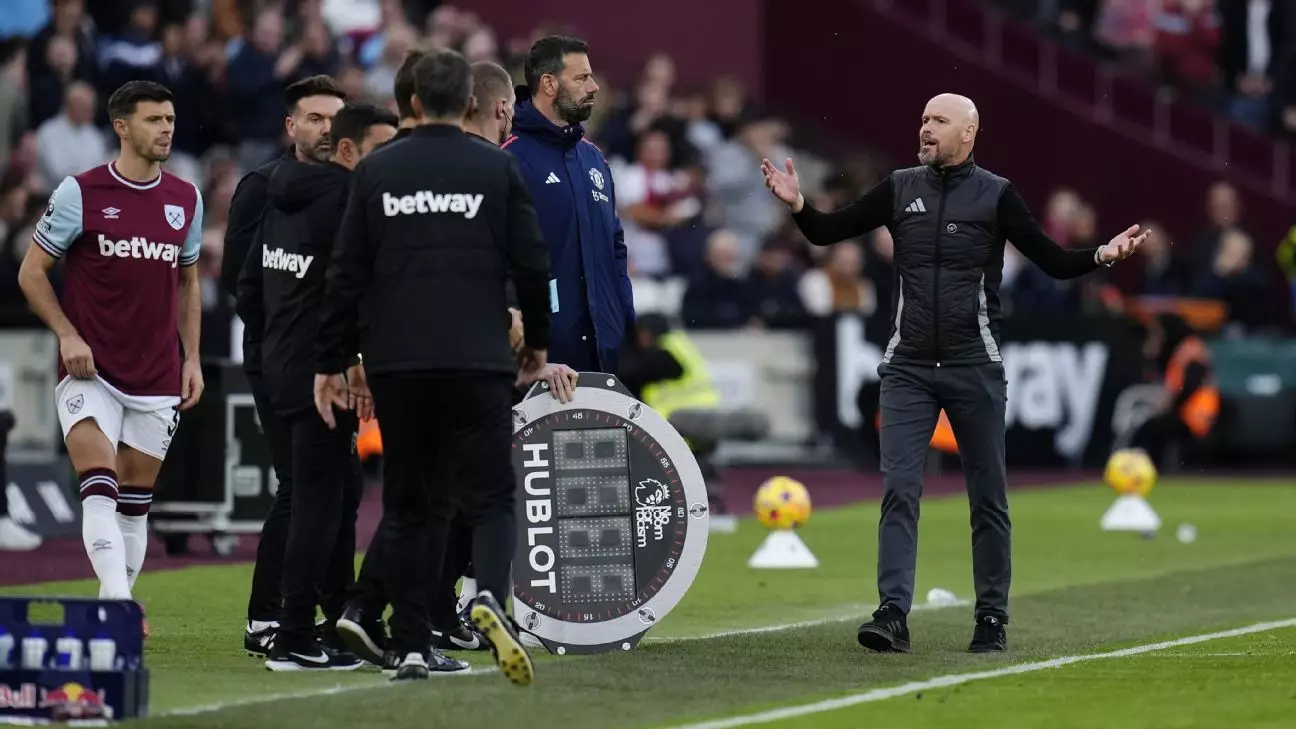In the charged atmosphere of the Premier League, crucial match decisions can sway team fortunes dramatically. One such instance occurred when Manchester United faced West Ham United, a match that culminated in a 2-1 defeat for United. The controversy centered on a late penalty awarded to West Ham after a VAR intervention. As Erik ten Hag expressed his frustration, the debate highlighted the ongoing issues surrounding the Video Assistant Referee system and its perceived inconsistencies.
As the match drew to a close, Manchester United appeared to have salvaged a point from their encounter at West Ham’s London Stadium. However, a call for a review by VAR officiated by Michael Oliver prompted referee David Coote to award a penalty after a marginal collision between Matthijs de Ligt and Danny Ings. Although the contact seemed minimal, the decision had sweeping ramifications, reflecting once again the fragile nature of officiating in high-stakes football.
In post-match discussions, Ten Hag dissected the officiating process. He lamented that the concept of “clear and obvious” had been sidelined, contributing to what he termed a flawed execution of VAR’s intended function. He pointed out that the refereeing team’s inconsistency undermined the integrity of the game, citing a previous incident where a non-intervention by VAR was equally contentious.
Rather than assign blame to individuals, Ten Hag focused on the overarching process governing VAR usage. His criticism highlighted the necessity for referees to exhibit decisiveness and professionalism when making pivotal calls. He articulated that the lengthy deliberation—three minutes before the decision—should have resulted in a more judicious conclusion, one that aligns with the principles of fairness and accuracy that VAR aimed to introduce to the sport.
There’s a palpable disconnect between what is expected from VAR and its real-time implementation. Ten Hag’s references to past incidents underline a pressing concern: whether officiating bodies are adhering to their own guidelines consistently. His remarks suggest a search for accountability that could resonate not only with United’s fanbase but with a wider audience weary of controversial outcomes shaped by ambiguous interpretations of regulations.
The defeat against West Ham thrust Manchester United further down the Premier League table, falling to 14th position. This ignominious ranking was exacerbated by a disheartening trend of inconsistency. Ten Hag acknowledged the team’s misfortunes but maintained that good performances and the right mentality could reconnect them with their winning identity. Notably, he pointed to the emerging potential in his squad, even in the face of these setbacks, suggesting that a turning point could be on the horizon if they continued to play with determination.
Critics may argue that luck should not be a decisive factor at this level, where professional teams are expected to harness skill and strategy. Yet, Ten Hag’s remarks seem to imply that external influences, both from officiating and perhaps within team dynamics, have hindered their progress. This raises questions about mental fortitude and adaptation under pressure, particularly for a team recognized for its historical resilience.
United’s upcoming matches present a critical juncture for the team. Their next fixture against Leicester City in the Carabao Cup could offer them a chance to regroup and regain confidence. Following that, they will face Chelsea, a fixture that not only demands tactical acuity but also psychological resolve. The prospect is demanding, and how the team navigates this challenging schedule could define their season.
Ultimately, Manchester United’s current plight illuminates the broader challenges faced by teams contending with the complexities of VAR and evolving competitive landscapes. Ten Hag’s frustration serves as a clarion call for more robust systems and protocols while offering a reminder of the pivotal role that luck, decision-making, and resilience play in the beautiful game.

